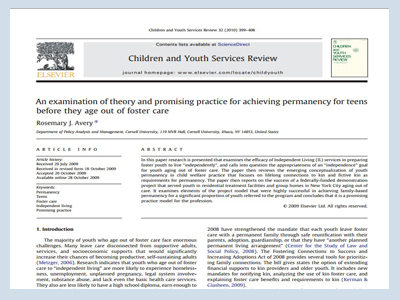An Examination of Theory and Promising Practice for Achieving Permanency for Teens Before They Age Out of Foster Care
Rosemary J. Avery
Children and Youth Services Review 32 (2010) 399–408
In this paper research is presented that examines the efficacy of Independent Living (IL) services in preparing foster youth to live “independently”, and calls into question the appropriateness of an “independence” goal for youth aging out of foster care. The paper then reviews the emerging conceptualization of youth permanency in child welfare practice that focuses on lifelong connections to kin and fictive kin as requirements for permanency. The paper then reports on the success of a federally-funded demonstration project that served youth in residential treatment facilities and group homes in New York City aging out of care. It examines elements of the project model that were highly successful in achieving family-based permanency for a significant proportion of youth referred to the program and concludes that it is a promising practice model for the profession.
The majority of youth who age out of foster care face enormous challenges. Many leave care disconnected from supportive adults, services, and socioeconomic supports that would significantly increase their chances of becoming productive, self-sustaining adults (Metzger, 2006). Research indicates that youth who age out of foster care to “independent living” are more likely to experience homelessness, unemployment, unplanned pregnancy, legal system involvement, substance abuse, and lack even the basic health care services. They also are less likely to have a high school diploma, earn enough to support themselves, or participate in post-secondary education or training (Courtney, Dwosrky, Ruth, Havlick & Bost, 2005). Foster care support, which provides housing, financial support, and a range of health, education and other needed services, typically ends when youth are developmentally unprepared to assume full adult roles and responsibilities. Furthermore, Independent Living (IL) programs have proven inadequate to prepare youth for “independence” in any meaningful way. Too many youth leave care unconnected to committed adults in their lives who could buffer the challenges they face and serve as safe havens in times of need.

